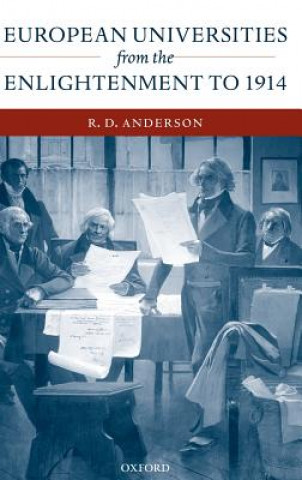
Doručení
Nákupní rádce





Nehodí se? Vůbec nevadí! U nás můžete do 30 dní vrátit
 Dárkový poukaz
V libovolné hodnotě
Dárkový poukaz
V libovolné hodnotě
S dárkovým poukazem nešlápnete vedle. Obdarovaný si za dárkový poukaz může vybrat cokoliv z naší nabídky.
European Universities from the Enlightenment to 1914
 Angličtina
Angličtina
 844 b
844 b
30 dní na vrácení zboží
Mohlo by vás také zajímat


Since the 1970s, the history of universities has become an important scholarly field, but there have been few attempts to bring this work to a wider audience. In European Universities from the Enlightenment to 1914, Robert Anderson provides an authoritative account of the development of European universities in the 'long' nineteenth century. The reforming rulers of the Enlightenment, the 'Humboldtian' model of the university developed in Germany, and Napoleon's institution of a centralized state system all contributed strands to a complex pattern which was reflected, in the age of nationalism, in distinctive national systems. While 'European' in their traditions, universities were also central to the formation of national elites and national consciousness. There are separate chapters on university systems in Germany, France, Britain (seen here as less of a special case than is often supposed), Italy and Spain, Russia, and the Habsburg Empire. These chapters are tied to more general themes which include the lasting significance of religious issues despite the progress of secularization, the involvement of professors and students in politics before and after 1848, the growth of the research ideal, and the development of the concept of academic freedom. There is a thorough discussion of the sociology of university attendance, and chapters of pioneering synthesis on women and universities and on student communities. Anderson's general argument is that the 'modern' university was consolidated in the 1870s and 1880s; by 1914 its ideals were under strain from academic specialization, the financial demands of scientific research, and the rise of virulent strains of nationalism and antisemitism - yet the liberal university retained its rationale and its vigour. This is no narrow study of educational history, but will appeal to all those with an interest in the political, social, and cultural history of the nineteenth and early twentieth centuries. It also has an extensive multilingual bibliography.
Informace o knize
 Angličtina
Angličtina




 Jak nakupovat
Jak nakupovat



















